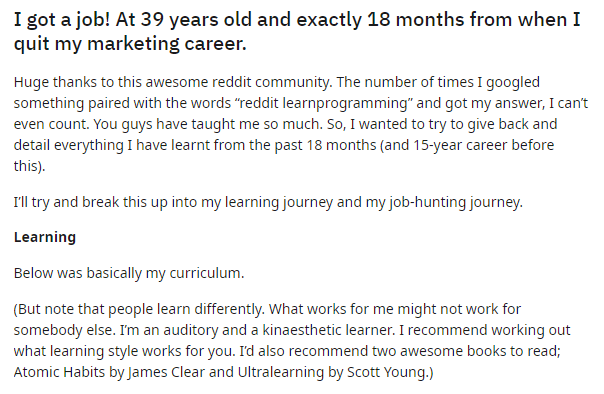11 Tips on How To Change Careers the Right Way in 2023

In this article
The idea of switching careers can be both exciting and nerve-wracking. On the one hand, you have the possibility of a wholly fulfilling new professional track, one that’s unlike anything else you’ve had before. But on the other hand, you also realize that there are many risks and unknowns that come with making a career change.
If you’re on the fence about making the move, then rest assured that what you’re feeling isn’t unusual. Gaining the skills required for a job in a new industry and then going about the process of landing a job in the said industry can seem arduous. But rest assured that there are smart ways to go about making a career change, and that’s exactly what we’re going to break down for you in this post.
Is It Easy To Change Careers?
When tackling this question, we want to be more practical than accurate in our assessment. Changing careers might be easy for some and harder for others. But what you don’t want to do is start making a transition into a new career expecting it to be a cakewalk.
As we’ll see in a subsequent section of this post, there are several steps that you can take to make a smooth transition into a new career. These are simple to do but not necessarily easy. You can run into roadblocks when it comes to things like working on side projects or applying to jobs. That said, trusting the process will eventually help you make inroads in the industry you’re trying to break into.
How To Know It’s Time To Change Careers
There’s something we need to talk about before we cover how you can change careers. How do you even know when it’s time to make that change? Here are a few signs that you should consider a job in a new industry or domain.
You’re Not Interested in the Work
Feeling uninterested or unexcited by the work that you do is evidence that your skills are better applied elsewhere. This might be work that you’re still very good at or were once excited to do. But if you don’t feel the same passion for your work and that’s because of the nature of the job itself, then you should start thinking about a new career.
You Feel Burned Out Often
Feeling burnt out at work doesn’t happen only because of demanding bosses or heavy workloads. You could be having that experience because your current job simply isn’t engaging you or your strongest skills enough. If that’s why you feel burdened at work, then you should consider a career change.
You Dread Going To Work

If you begin to feel a sense of dread welling up inside you on Sunday evenings because you have to be at work on Monday, then that’s a good sign that your current job isn’t the right one for you. Believe it or not, work should be fun and be something that you look forward to doing. Settling for less can have a negative impact on your health and how you perceive your own abilities.
There Is No Room for Advancement
If you aren’t busy moving forward, then you’re probably moving backward. A good job is one where you can move up in the ranks to take on more challenging assignments, work with better people, and negotiate higher salaries. And when your current career track doesn’t allow that, you should start working towards a new one.
11 Tips To Make a Career Change Easier
-
Determine the Why
-
Make a Plan That Starts With the Career You Want
-
Round Out Your Skills and Resume
-
Consider a Lateral Move at Your Current Company
-
Test the Waters With a Side Project
-
Build Out Your LinkedIn and Portfolio
-
Tap Your Network Before Applying for Jobs
-
Ask for Feedback During Interviews
-
Consider Taking a Break From Your Current Job
-
Negotiate Hard Even if You’re New to the Industry
-
Take Your Time
Now we know the signs that confirm that a career change is in order. Let’s take a look at how you can make that happen in the best way possible.
Determine the Why
Like Simon Sinek loves to say, you have to start with your ‘why.’ That means taking some time to reflect on the reasons you’re transitioning into a new career.
Are you making the move because you want a more fulfilling career? Is the lack of upward mobility in your current job the source of the problem? Are you looking for a job that won’t burn you out like the current one is? Answering some of these questions can help you establish why you’re making the transition, which will then make the rest of the process easier.
Make a Plan That Starts With the Career You Want

Once you know why you’re working towards a new career, you can start narrowing down your options and choose a career track that seems like it ticks all the right boxes. This new career will serve as your north star.
Along with giving you a sense of direction, choosing your new industry or domain at this stage can be energizing. It gives you the ability to imagine what your new career will look like and the benefits you will reap from seeing this transition through. That’s the kind of impetus you need at this stage to do everything else that it takes to make the career change happen.
Round Out Your Skills and Resume
A new career means having to gain new skills. After all, this is a job in a new domain or industry and you probably don’t have all the skills necessary to be given professional responsibilities yet.
You don’t need to go back to school and get an entirely new degree so you can start working in a new industry. A much easier, more accessible way of adding new skills to your arsenal is online courses. There are now courses that you can complete online that cover every industry and job portfolio you can think of. These are often self-paced and taught by highly credentialed instructors.
Related Read: How To Change Your Career to Sales
What makes the case for online courses stronger is the fact that more companies and recruiters are beginning to take them more seriously. So not only do you learn new skills but also gain a credential or certification that will look good on your resume.
Speaking of your resume, it’s time to make some changes to it. Your new resume has to reflect that you’re looking for a job in a new industry. That means tweaking your resume to highlight classes, courses, and certifications that are relevant to the new career you’re going for.
In some cases, it might seem like your current professional experience is in no way relevant to your new career. But you might want to revisit that assumption.
Let’s say you’re currently a journalist applying to a data analyst role. Your writing skills could help you write better requirements specs for data projects. You might have worked on assignments before that required data collection and visualization. These might not be apparent at first, but going through your resume carefully can help you identify and highlight skills that are transferable to a new career.
Consider a Lateral Move at Your Current Company
There are several reasons why companies like hiring internally when new roles open up. The most obvious reason is that companies already know internal candidates well and don’t have to do all of the additional background checks when making a new hire. That means that your new career opportunity might be available at the company that you’re currently working at.
To get hired to a new job internally, start by keeping an eye out on your company’s job board. Research any new positions that pop up in the industry that you want to work in. That includes knowing what the qualifications for the new job are and what the candidate’s responsibilities will be.
Next, try to set up a meeting with the human resource manager in your target department. Communicate your interest in the role and find out what you can do to make yourself an attractive candidate.
Once you’ve completed those steps, you can go about actually applying for the job. That means filling up gaps in your skillset, updating your resume, and finally, applying for the role.
Test the Waters With a Side Project
A good way to fast-track your learning in a new career is to work on a side project.
Let’s say you’re trying to break into front-end web development. Once you’ve picked up the requisite skills, you can come up with a side project idea to show off what you’ve learned. That might mean creating a personal website or using Bootstrap to create a landing page for a product.
Creating side projects can be a useful practice in many ways when making a career change. It helps you understand what hands-on work in a new industry looks like, gives you something to put on your portfolio, and is something that recruiters can look at to gauge your skills.
Once you’ve completed your project, don’t forget to add it to your resume. Mention the goals of the project, the tools that you used, and include screenshots if they’re relevant.
Build Out Your LinkedIn and Portfolio

As much as 72% of recruiters use LinkedIn to identify new candidates or vet ones who have applied to roles at their company. It is imperative that you revamp your LinkedIn to show recruiters the new career that you’re working towards.
Start by editing your title to convey that you’re looking to be hired in the new industry. You might say something like, “seeking an entry-level position in social media marketing,” for example. Update your skills section to show that you’ve got chops in the area. So if you’re a social media marketer, you would add skills like copywriting, graphic design, social media analytics, and so on.
Finally, update your summary section. This is where you get the opportunity to elucidate that you’re making a career change, why you took that decision, and the skills that you’ve gained in that domain.
You will also need a portfolio to go along with your revamped LinkedIn profile. Portfolios are the strongest evidence you have of your newly minted skills and your ability to deploy them in real-world projects. If you don’t have too many portfolio items yet, you can start by working on side projects or open-source projects and list them on your portfolio.
Tap Your Network Before Applying for Jobs
78% of recruiters have said that referrals are the best way to find high-quality candidates. Referred applicants are 15 times more likely to land a job than others. Clearly, you should be tapping into the power of referrals when looking for a job in a new industry.
The easiest way to get referred for a job is by leveraging your network. Start by talking to friends and colleagues who work in the industry that you’re trying to build a career in. Let them know that you’re looking for a job and gather any advice that you can on landing a job.
You can also tap social networks to gain referrals. Let’s say you find out that a company is hiring for your role on LinkedIn. You can find people working at that company on LinkedIn and see if you have connections in common with them. If you do, you can request to be connected and get in touch with managers hiring at your target company.
Ask for Feedback During Interviews

When you’re making a career change, interviews are as much an opportunity to learn as they are a chance to land a job. So make seeking feedback a part of your interview process. At the end of every interview, ask hiring managers what you did well and which areas you can improve in.
The feedback you can get from doing that can be invaluable. Recruiters who are open to spending a little extra time with you will let you know whether you’re communicating well, how you can improve your resume, and what additional skills or portfolio items you need to become a more attractive candidate. Working on that feedback will help you land a job in a new industry much faster than if you weren’t getting feedback from recruiters.
Consider Taking a Break From Your Current Job
Striking a balance between your existing job and building your new career can be tough. If you can afford it, take a break from your job so you can focus on gaining new skills and building your portfolio. This is a luxury for some but the time off can help you make big strides towards a job in a new industry.
Although it might be a long shot, you can check if your company has a sabbatical policy that you can take advantage of in this phase. Even a couple of months away can greatly help your cause. Finally, plan out how you will present the idea to your boss and make sure that you have the financial cover required to take some time off work.
Negotiate Hard Even if You’re New to the Industry

Once you do enter the interview process, make sure that you don’t undersell yourself. You might be green and looking for any opportunity to break into a field, but you’re still going to bring value to your company.
The first step to a successful negotiation is researching what salaries look like in your industry at your level. Prepare to justify your ask by talking about average salaries in the industry, the skills that you’ve gained, and any certifications or courses you’ve completed.
Most importantly, don’t turn the negotiation into a bargaining session. State your value clearly and set defensible benchmarks for your salary.
Take Your Time
A career change is not an easy thing to pull off. It takes both ambition and careful execution, all while having to focus on your existing job. Make that process easier on yourself by giving yourself ample time. Don’t get worried when you don’t land your new job in a couple of months. Follow the process, build your skills, and keep getting better at interviewing in your new role.
Career Change Myths
There are a few misconceptions associated with switching careers. Here are the most common ones and the right way to think about them.
I’m Too Old To Change Careers

It is never too late to make a career change, no matter what your background is and how daunting your new line of work may seem. If anything, your age can play to your advantage because you’ve gathered more experience in the professional world than your younger counterparts and you can tap into a larger network in your job hunt.
I’ll Have To Start Over if I Switch Careers
In one way, yes, you are starting over if you switch careers. You might have to start at the bottom of the professional totem pole and at a lower salary than you were getting earlier.
But another perspective on this is that none of your prior experience has gone to waste, even if you’re working in a new industry. You can still tap into everything you’ve learned along the way and put it to use in your new job. Additionally, recruiters might consider your existing experience as valuable and put you in contention for better roles than you expected, allowing you to negotiate higher salaries.
Career Change Examples
Example 1

Source: Reddit
Here’s an encouraging story of a 39-year-old who went from being a marketer to a programmer in a matter of 18 months. All of their learning was focused around online course platforms like The Odin Project and Free Code Camp, which is evidence of just how much you can pick up from a regimented learning path online.
The candidate also emphasizes reading job descriptions carefully so you can tailor your resume and optimize your LinkedIn profile. Those are both things anybody making a career change should do almost obsessively. The entire post is full of invaluable nuggets of wisdom. You can read it here.
Example 2

Source: Towards Data Science
Rodrigo Castilho managed to successfully switch careers twice in a span of 11 months and all during a pandemic. His story is evidence that it is possible to make wholesale changes to your career trajectory in a short span of time.
Castilho’s biggest takeaways from the process appear to be about the importance of networking. He talks about how hitting up someone at the company you’re applying to and giving them a shorter version of your cover letter is a lot better than applying on a job board like everyone else.
Castilho also talks about how you can get through most of the phases of an interview for a technical programming or data role without actually writing code. The trick, as he reveals, is to talk like a veteran and describe your experience in the field in detail. The full post is available here.
FAQs About Switching Careers
Can You Be Too Old To Change Careers?
No, you’re never too old to switch careers. In fact, your experience might boost your ability to interview well and demonstrate an ability to perform well in a professional setting. What you do need to do when switching careers, no matter what your age is, is to work on gaining new skills and build a solid portfolio.
Does It Look Bad on a Resume To Change Careers?

Changing careers doesn’t look bad on your resume. You just need to let recruiters know why you’ve decided to make the change and what skills and side projects you’ve worked on to make yourself well-suited for a professional environment in a new industry.
Is Changing Your Job the Same As Changing Your Career?
Changing jobs is a lot easier than changing careers because you’re looking to work within the same industry that you’ve already gained experience in. Changing your career, on the other hand, involves gaining skills in a whole new industry and working on side projects in that field. That makes changing careers an entirely different ballgame compared to finding a new job.
Not ready to enroll just yet? Read more about the factors you should consider while picking a program in our bootcamp criteria guide.
Disclaimer: We’ve worked hard to ensure the information in this comparison guide is accurate and up-to-date. However, mistakes happen. If you spot an error, please get in touch with us at hello@springboard.com and we’ll correct it right away.
Since you’re here…Are you a future data scientist? Investigate with our free guide to what a data scientist actually does. When you’re ready to build a CV that will make hiring managers melt, join our Data Science Bootcamp that guarantees a job or your tuition back!


